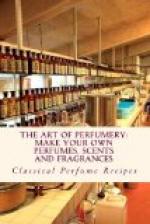Although Eau de Cologne was originally introduced to the public as a sort of “cure-all,” a regular “elixir of life,” it now takes its place, not as a pharmaceutical product, but among perfumery. Of its remedial qualities we can say nothing, such matter being irrelevant to the purpose of this book. Considered, however, as a perfume, with the public taste it ranks very high; and although it is exceedingly volatile and evanescent, yet it has that excellent quality which is called “refreshing.” Whether this be due to the rosemary or to the spirit, we cannot say, but think something may be attributed to both. One important thing relating to Eau de Cologne must not, however, pass unnoticed, and that is, the quality of the spirit used in its manufacture. The utter impossibility of making brandy with English spirit in any way to resemble the real Cognac, is well known. It is equally impossible to make Eau de Cologne with English spirit, to resemble the original article. To speak of the “purity” of French spirit, or of the “impurity” of English spirit, is equally absurd. The fact is, that spirit derived from grapes, and spirit obtained from corn, have each so distinct and characteristic an aroma, that the one cannot be mistaken for the other. The odor of grape spirit is said to be due to the oeanthic ether which it contains. The English spirit, on the other hand, owes its odor to fusel oil. So powerful is the oeanthic ether in the French spirit, that notwithstanding the addition to it of such intensely odoriferous substances as the ottos of neroli, rosemary, and others, it still gives a characteristic perfume to the products made containing it, and hence the difficulty of preparing Eau de Cologne with any spirit destitute of this substance.
Although very fine Eau de Cologne is often made by merely mixing the ingredients as indicated in the recipe as above, yet it is better, first, to mix all the citrine ottos with spirit, and then to distil the mixture, afterwards adding to the distillate the rosemary and nerolies, such process being the one adopted by the most popular house at Cologne.
A great many forms for the manufacture of Eau de Cologne have been published, the authors of some of the recipes evidently having no knowledge, in a practical sense, of what they were putting by theory on paper; other venturers, to show their lore, have searched out all the aromatics of Lindley’s Botany, and would persuade us to use absinthe, hyssop, anise, juniper, marjoram, caraway, fennel, cumin, cardamom, cinnamon, nutmeg, serpolet, angelica, cloves, lavender, camphor, balm, peppermint, galanga, lemon thyme, &c. &c. &c.
All these, however, are but hum—! Where it is a mere matter of profit, and the formula that we have given is too expensive to produce the article required, it is better to dilute the said Cologne with a weak spirit, or with rose-water, rather than otherwise alter its form; because, although weak, the true aroma of the original article is retained.




